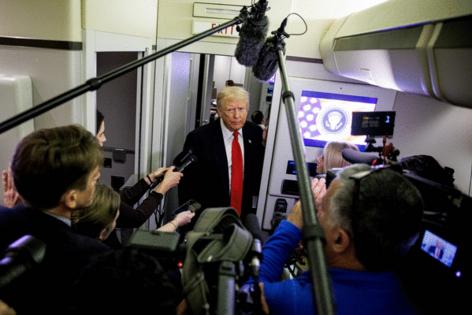Editorial: Protect the filibuster from petty politics
Published in Op Eds
President Donald Trump is urging Senate Republicans to end the filibuster to bring the month-long government shutdown to a close.
That’s a really bad idea, and the Republicans know it’s a really bad idea. They told us so when Democrats threatened to end the cloture rule after President Joe Biden was elected, and they were frustrated that an equally divided U.S. Senate was blocking the implementation of his progressive agenda.
The filibuster is one of the last remaining protections against the tyranny of the majority.
Enacted in 1917, it is designed to ensure adequate deliberation in lawmaking. While the U.S. House is a straight-up majority rule institution, the filibuster has made the U.S. Senate a deliberative body somewhat shielded from the passions of the day.
Had Democrats succeeded in ending the filibuster during the Biden administration, they most certainly would have nationalized healthcare, enacted extreme gun control measures, passed the Green New Deal, stacked the U.S. Supreme Court and added more Democratic-majority states to the union.
Republicans now want to do what they said the Democrats shouldn’t do back then to not only end the shutdown, but also to impose the changes they want to see to Obamacare and a variety of welfare programs, among other items on the Trump wish list.
It’s been said that the filibuster empowers the minority and frustrates the majority. The benefit is that it forces the Senate to engage in consensus-building to reach an agreement. While in reality that has gone off the rails in recent years, it’s still the best protection against mob rule.
Under the filibuster rule, the Senate must have 60 votes to end debate and take a vote on a bill. Getting to the 60-vote margin isn’t easy, but lawmaking isn’t supposed to be a breezy endeavor. Our system was built to encourage vigorous give-and-take and to move final decisions toward the middle.
Critics say the filibuster has contributed to our broken political system and has held up or derailed too much legislation. The system is indeed broken, but getting rid of the filibuster won’t fix it.
We offer Republicans the same cautionary advice we gave Democrats when they were the ones hoping to axe the filibuster for partisan gain
They should remember they will not always be in power, and when Democrats again take over the Senate, it will be the GOP that is sitting without leverage in the lawmaking process.
It’s not the rules that are the problem in Washington – it’s the people who find it so uncomfortable operating within those rules.
Lawmakers should be able to end this shutdown through the normal process of “I’ll give you this if you give me that.” The all-or-nothing approach that has taken hold in Washington, which treats compromise as a dirty word, is the root cause of the dysfunction.
If Republicans and Democrats can agree on nothing else, it should be that preserving the filibuster is in the interest of both parties, given the wide political pendulum swings the nation experiences.
In the scope of things, this shutdown is nowhere near the biggest, nor the most divisive, issue that has faced the country. Congress has resolved bigger and more contentious matters without tearing up the rulebook. And they should do so this time.
_____
©2025 www.detroitnews.com. Visit at detroitnews.com. Distributed by Tribune Content Agency, LLC.
























































Comments